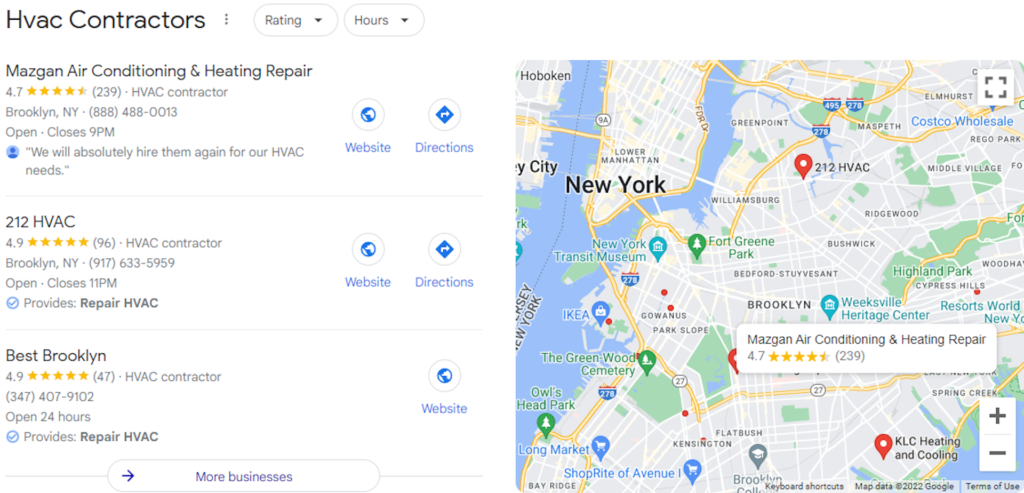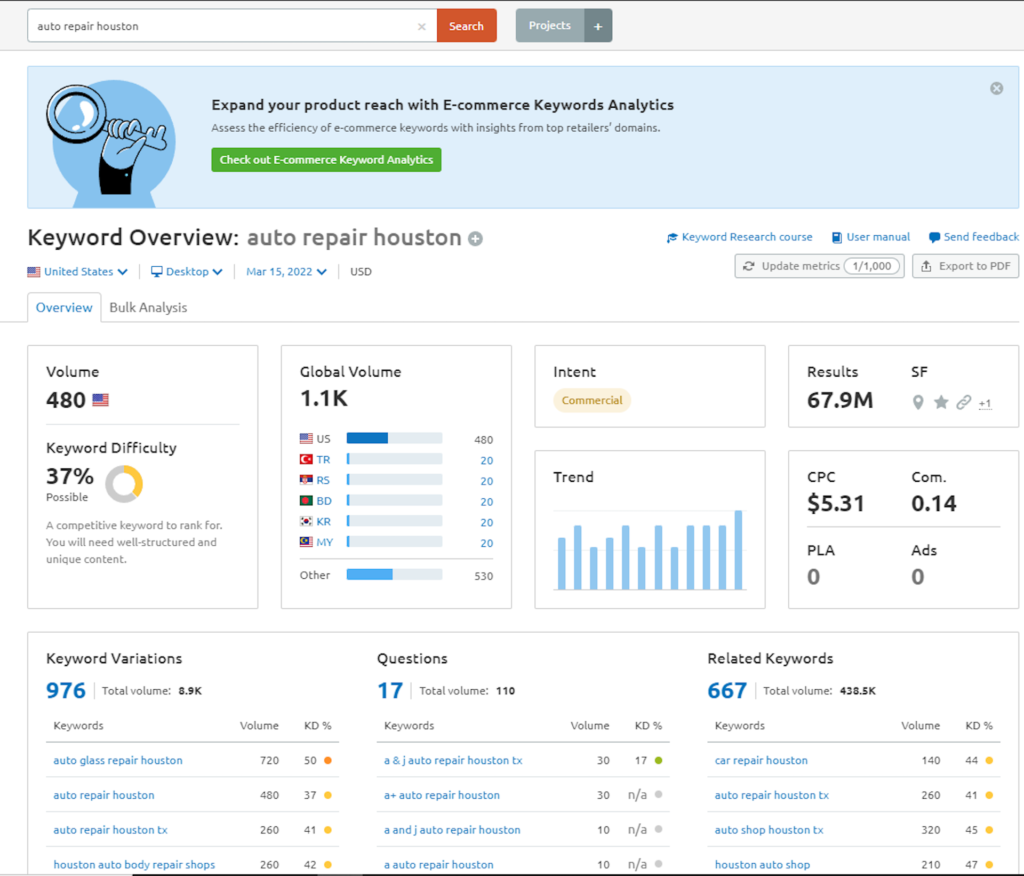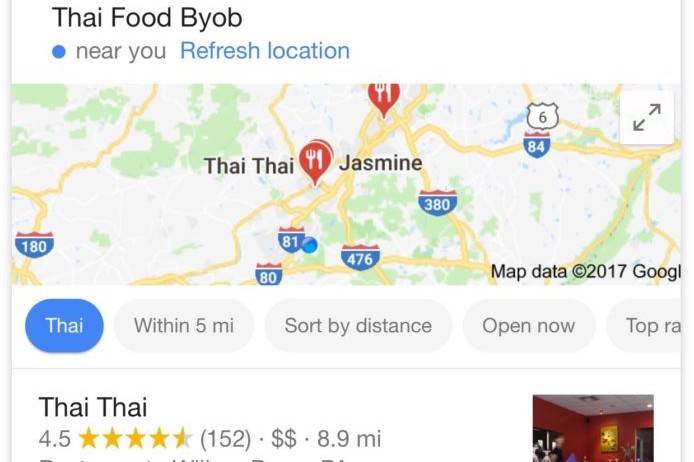When planning an effective SEO strategy to generate leads and drive revenue for your business, keyword intent is crucial.
Perhaps no keywords have higher commercial intent and better lead value than “near me” keywords. Studies have shown that “near me” searches over mobile have grown exponentially over the past few years, as Google Business Profile results often serve as a one-stop shop for service-based inquiries.
These local searches often serve as the primary channel for customers to connect with local businesses, including restaurants, pharmacies, auto parts stores, pet supply stores, and many other types of establishments.
Virtually all of ContentMender’s SEO campaign services involve some aspect of local SEO to help connect companies, large and small, with the local needs of regional customers.
For franchise-based businesses, investing in a Hyperlocal SEO Strategy is paramount to success and often requires the least amount of resources to be successful.
Drawing on our experience managing multiple locations for several clients, the team at ContentMender has developed a franchise SEO strategy that can help you grow both individual locations and the corporate business as a whole.
How Franchise SEO Works
Franchise SEO attempts to connect local-based franchises with regional customers digitally.
By optimizing location-specific pages for individual franchisees and the corporate brand website, you can provide customers with a resource to contact each business and provide relevant information for local-based searches.
However, the approach to franchise SEO will depend on the structure of your business and its digital presence. Let’s explore two different scenarios commonly found for franchise businesses:
- Creating a corporate brand website with the ability to manage multiple location pages.
- Managing a single franchisee landing page to promote your business as a franchise owner.
Additionally, we must note that the level of creative freedom an individual franchisee has over their webpage will depend on their corporate brand guidelines.
How Does Franchise SEO Differ from Regular SEO
Franchise SEO incorporates many of the same strategies as traditional SEO, including using local-based strategies, such as citation building, Google Business Profile optimization, and local content creation.
Franchise businesses often benefit from working with an established brand, which can make attracting foot traffic to your location much easier. These businesses also have access to branding and marketing materials from corporate partners, which can help them thrive in a regional market.
However, the strategy becomes more complex when a franchise business has multiple locations within a given area. Structuring your website accordingly and investing in the right local-based SEO strategies will help your franchise succeed on a long-term scale. To fuel this growth
7 Franchise SEO Tips to Supercharge Your Business
Follow these franchise SEO tips to optimize each location-based page to drive the most foot traffic or calls to each local franchise branch.
1. Create Location-Specific Pages or Subdomains
When organizing a website for multiple locations, it is essential to create a proper structure from the outset that allows the website to scale with the business’s growth.
In the case of franchise businesses, this could include several different strategies geared toward helping your customers connect with the correct location:
- Create subdomains for each franchise (recommended for smaller franchises): For businesses with 10 or fewer franchise locations, creating separate subdomains with customized service menus can help segment customers effectively. However, this strategy is better suited for smaller franchises with locations that are widely dispersed.
- Create location-specific pages (recommended for companies with multiple franchise locations): Creating location-specific pages with NAP information (name, address, phone number) and a call-to-action is the easiest way to help local customers discover each location through local search.
In terms of the broader franchise strategy, we recommend implementing an easy navigation that allows local customers to find each location if they happen to land on your main brand website. Strategies could include an “Areas We Service” menu link or a search bar that can help customers find a location by zip code or address.
2. Create a Google Business Profile
Optimizing your Google Business Profile for Google Maps and local search is critical to capturing local organic search traffic originating from “near me” searches and location-based keywords.
For example, a 2014 Google study found that 50% of local mobile searches resulted in a store visit that same day. We can only speculate that this number has grown as mobile search has advanced.
One important thing to remember is that Google serves results for local search based on “relevance, distance, and prominence.” As a result, not all local “near me” or location-based keyword searches will display the closest businesses in terms of distance.
With that in mind, businesses can compete across wide regions by offering the most accurate and relevant information on their Google Business Profile page.

Fortunately, optimizing a Google Business Profile is relatively quick and easy. Here are some tips to achieve the best results for your local franchise business:
- Ensure proper NAP information and consistent branding
- Regularly upload high-quality photos
- Add a list of relevant products and services based on keyword research
- Respond positively to reviews
- Write a brief, but detailed description of your business
- Fill out a Q/A based on common customer questions
- Utilize Google Posts to help promote your business
Be sure to create a profile for each franchise-based location, as customers may search for directions to one location and be led to another.
3. Use Location-Based Keywords
You’ll need to optimize individual location-based landing pages with local keywords corresponding to local user queries.
Conducting keyword research helps you uncover common user questions and complaints in your area and discover which keywords are most often associated with user searches.
Implementing local keywords on your website also helps search engines index your website or landing page for these specific terms.
For example, suppose you’re starting an auto repair shop in Houston based on an existing franchise. The first thing you’ll want to do is break out your keyword planner and conduct a search of all relevant keywords to your industry and see which terms provide the best volume:

In this case, “auto repair Houston” commands a greater search volume than ‘car repair,’ ‘mechanic,’ and other Houston-based auto repair terms.
Using this information, you can optimize the following metadata of your landing page to correspond with searches for “auto repair Houston”:
- Title tag
- Meta description
- H1 Tag
- The first paragraph of the page copy
Consider these keyword research tips and sources to help you discover content ideas that will appeal directly to user interests and pain points:
- Related searches on Google
- Competitor title tags
- Answer box questions
You can then incorporate these phrases into your copy page to nurture leads who land on your webpage. Additionally, you can answer popular user questions directly on your website with a Q&A.
4. Set Up Local Schema Markup
As helpful as local keywords are, you can’t guarantee search engines will index your website for local search. Fortunately, that’s where schema markup comes in.
Schema markup is a form of structured data or semantic language that search engines use to understand your website better.
Without getting too technical, you can insert schema markup for the following information to assist in proper indexation:
- Operating Hours
- Review Ratings
- Geo Location
- Address
- Prices
- Telephone Numbers
Most importantly, Google provides its own Structured Data Markup Helper and Structured Data Testing Tool to help you utilize this data.
5. Build Out Strategic Backlinks and Citations
Once you have a solid SEO foundation for your website and Google Business Profile listing, it’s time to acquire exposure.
Fortunately, Google is not the only avenue to acquire organic exposure, as there are several popular directories you could leverage, including:
- Yelp
- Better Business Bureau
- Angi (Contractors and Service-Based Businesses)
- Trip Advisor
- FourSquare
- UrbanSpoon
- Yellow Pages
These citation and directory links can be acquired from strategic local sources using tools like Moz’s Local Listing Score.
Additionally, you could acquire links from highly valuable sources, such as local magazines, blog posts, and newspapers that promote local businesses in your area.
Regardless of whether you’re a chain or franchise, securing a link on a popular blog describing the best retail stores or grocery stores in an area can drive serious foot traffic to your store.
With this in mind, we’ve provided a few additional backlink strategies that build your website authority and give your business exposure:
- Acquire links for unlinked mentions
- Host charitable events in your area
- Host contests and giveaways
- Run a sale
- Research competitor backlinks using Majestic and Ahrefs for additional ideas
White labeling content production and link building is a great strategy for building your online brand and focusing more on offline strategies within your local community.
Bonus: Ensure NAP consistency across citations. Search engines prioritize citation accuracy when organizing local “near me” searches, so one mistake or inaccuracy can have negative consequences on your search visibility.
6. Leverage Positive Reviews
There is no better proof of quality than social proof. Research shows that most people read reviews before purchasing products and often trust them as much as personal recommendations.
While reviews don’t impact local search algorithms, they provide evidence pointing to the quality of your business.
Be sure to incentivize customers to leave a positive review after positive service to help boost your Google and Facebook ratings.
Furthermore, be sure to respond to negative reviews promptly and offer a solution to any issues to help retain upset customers. Some psychologists believe that transforming a negative customer experience into a positive one can ultimately inspire greater customer loyalty.
7. Use Local-Based Content to Grow Individual Locations
Most people don’t realize that Google takes geographic location seriously when ranking local search results. While your address is a major factor in this, there are other strategies you can use to nudge results in your favor.
For example, when creating location-specific pages, we like to mention local geographic landmarks, the local history, and other local signals that appeal to users and help Google match that page with a specific location.
In the broader context of your blog marketing strategy, creating locally based content is a great way to build awareness for a particular location and acquire local links.
From there, this content can be shared with a local Google Business Profile location, thus reinforcing these local ranking signals in Google’s search results.
Contrary to popular belief, dominating local search is not simply a matter of adding local keywords to your website and calling it a day. Local SEO involves creating a local ecosystem of content that appeals to users and enhances visibility for a specific business location.
In the broader context of franchise SEO, utilizing these Hyperlocal strategies and tips can help boost traffic and visibility at each location, ultimately enhancing the brand as a whole.
FAQs
Why is SEO important for franchises?
SEO helps franchises increase visibility in local searches, drive more foot traffic, generate leads, and ultimately grow revenue. Even with strong brand recognition, each location must compete for local customers online.
Can individual franchisees do SEO if the corporate office manages the website?
Yes! Even if the corporate office controls the main website, franchisees can still optimize their Google Business Profile, build local citations, earn backlinks from local websites, and collect customer reviews to boost their local presence.
Does having good reviews help with franchise SEO?
Yes! Positive reviews build trust with potential customers and can influence local search rankings, especially in the “local pack” (Google Maps results).



